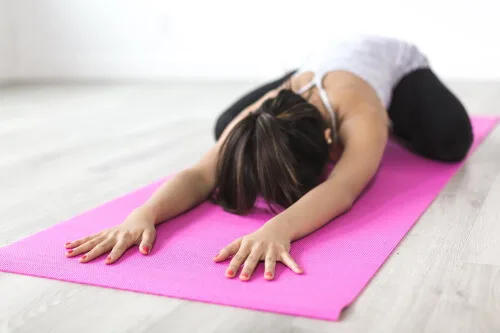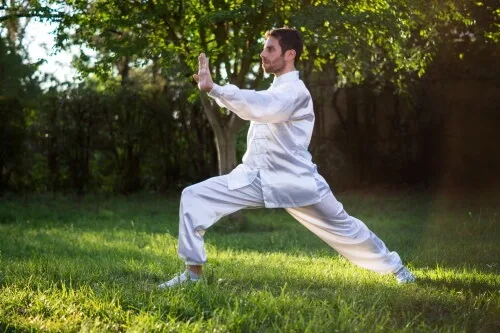What can you use meditation for? When most people think of meditation, they think of relaxation and stress relief. But there’s so much more.
Table of Contents

Hi, Ian here and welcome to this article!
Ever felt like your brain’s a pinball machine on maximum overdrive? Thoughts pinging around like rogue bumpers, anxieties flashing like neon signs, and focus weaker than a soggy teabag?
Yeah, me too. That’s where meditation comes in, my friend. It’s not just some dusty old practice for yogis in saffron robes. It’s like a mental spa day for the modern age, a superpower you can unlock in your own living room (or park, or bus – you get the picture).
But hold on, let’s rewind. What exactly can you use meditation for? Well, buckle up, because it’s a longer list than your grocery aisle on payday. Studies show meditation can be your BFF against stress (think melting away like butter on toast), a chill pill for anxiety (bye-bye, jitters!), and a focus booster that’ll make caffeine seem like yesterday’s news (seriously, a study in Behavioural and Brain Sciences found it can improve attention span better than Ritalin!).
But that’s not all, folks! Meditation can also be your secret weapon for better sleep (imagine waking up feeling like a million bucks, not a grumpy gremlin), a creativity catalyst (hello, next Picasso!), and even a pain reliever (yup, research in The Journal of Pain suggests it can ease chronic pain like a magic trick). Think of it as a Swiss Army knife for your mind, ready to tackle whatever life throws your way.
So, ditch the Netflix binges and grab your inner zen master. Meditation doesn’t need fancy equipment or years of practice – just five minutes of mindful breathing can work wonders. There are tons of free apps and online resources to guide you, like Headspace or Calm. Plus, it’s customizable! Whether you prefer guided meditations with soothing voices or silent sitting focusing on your breath, there’s a style out there for you.
Ready to unlock your inner calm and unleash the power of your mind? Dive into this article and let’s explore the wonders of meditation together. You might just surprise yourself with what you can achieve. See you on the other side, zen warrior!
What many don’t realize is that meditation has a lot of other benefits as well. In this article, we will discuss some of the ways that you can use meditation to improve your life.
Whether you’re looking for improved mental clarity, better physical health, or a deeper spiritual practice, meditation can help you get there. There are many benefits of meditation. Some of the most common uses include reducing stress, improving sleep, personal development, easing pain, and enhancing self-awareness.
In addition to these general benefits, meditation can also be used to target specific issues or concerns. For example, if you’re struggling with anxiety or depression, meditation can help to provide relief. So read on to learn more!
What Is Meditation And What Are Its Benefits?
Here, we will discuss everything you need to know about meditation – what it is, what benefits it offers, how to get started if you’re interested in practicing it, and more.
The goal of meditation is to focus on one thing—typically the breath—and to clear the mind of all other thoughts and distractions. In doing so, you may achieve a more relaxed state of mind, increased awareness, and decreased stress levels.
Some research also suggests that meditation may have benefits for overall health and well-being. There are many benefits to meditation, and it can be helpful for people of all ages. Some benefits include:
- Improved Focus And Concentration
- Reduced Stress And Anxiety
- Decreased Negative Emotions Such As Anger, Depression, And Fear
- Improved Sleep Quality
- Increased Feelings Of Happiness, Contentment, And Peace
- Better Self-Awareness And Insight
- Stronger Immune System
Additionally, meditation has been shown to decrease inflammation and promote positive emotional regulation.

How Can You Start Meditating On Your Own, Even If You’re A Beginner?
You don’t have to be a Buddhist Monk to learn how to meditate. If you’re interested in this subject, but don’t know how to meditate, don’t worry! There are plenty of ways to learn and practice meditation on your own, even if you’re a beginner. Here, we will explore some of the best methods for beginners, as well as offer some tips for getting the most out of your meditation practice.
There are a few ways to start meditating on your own. One way is to find guided meditation audio or video online. There are plenty of free options available, and most of them are short and easy to follow.
Another way to get started is by focusing on your breath. Simply sit in a comfortable position, close your eyes, and focus on your breath as it goes in and out. Count each inhale and exhale slowly, and continue counting until you reach 10 breaths. Once you’ve reached 10 breaths, start again at 1.
If you’re looking for a more physical approach to meditation, try Yoga or Tai Chi. Both of these activities involve slow movements.

What Are Some Of The Different Types Of Meditation That Are Available To You?
Maybe you’ve tried a few methods, or you may be completely new to the practice of meditation. Whichever category you fall into, it can be helpful to learn about the different types of meditation and what they offer. Here, we will discuss some of the most popular forms of meditation and their benefits.
Some of the most popular types of meditation include mindfulness meditation, mantra meditation, and transcendental meditation.
- Mindfulness meditation is a type of meditation that involves focusing on your breath and being present in the moment. Mantra meditation involves repeating a certain phrase or word over and over again to help you focus
- Transcendental meditation is a type of mantra mediation that involves using a specific mantra that is given to you by a teacher
- Yoga is a physical, mental, and spiritual practice or discipline that originated in India. Among the most well-known types of yoga are Hatha yoga and Raja yoga.
- Tai Chi is a form of martial arts that combines deep breathing and relaxation with slow, graceful movements. It is often practised for health benefits such as improving balance, strength, and flexibility. Tai chi is considered a “moving meditation” because it helps you focus on your breath and the present moment.
There are many other types of meditation as well, including walking meditation, movement-based meditation, and visualization-based meditation. It’s important to experiment with different types of mediation until you find one that suits you best.

Meditation Benefits For The Brain
The benefits of meditation are vast and well-documented. But what many people don’t know is that meditation also has a profound impact on the brain. Studies have shown that regular meditation changes the structure and function of the brain in positive ways, leading to improved cognitive function, emotional regulation, and memory recall.
But what about the brain? Does meditation have any specific benefits for cognitive function and overall brain health?
Research suggests that the answer is yes. Meditation appears to have several positive effects on key areas of the brain, including the hippocampus (involved in memory) and the amygdala (involved in stress response). Additionally, meditation has been shown to increase cortical thickness – a measure of healthy neural tissue – in certain regions of the brain.
All in all, the evidence suggests that meditation can be a powerful tool for boosting cognitive function and promoting overall brain health.
How Can You Use Meditation In Your Everyday Life To Improve Your Overall Well-Being And Happiness?
One of the great things about meditation is that it can be adapted to fit any lifestyle. Whether you’re a busy executive or a stay-at-home mom, there’s a form of meditation that can help you find peace and stillness in your everyday life. In fact, there are many ways that you can do this.
One way is to simply take a few moments out of each day to sit quietly and focus on your breath. This can help you to relax and de-stress, and it can also help to clear your mind so that you can focus better later on.
Another great way to use meditation in your everyday life is by incorporating it into your daily routine. For example, you can try meditating after you wake up in the morning or before you go to bed at night. This can help set the tone for the day ahead or help you wind down after a busy day.
Here are a few tips for incorporating meditation into your routine:
- Choose somewhere quiet where you can sit or recline. If possible, choose a spot where you won’t be disturbed
- Close your eyes and focus on your breath. Breathe in slowly and deeply, and breathe out slowly and completely
- If your mind wanders, slowly guide it back to your breath
- Practice for 10-15 minutes per session
Can Meditation Help With Specific Health Conditions Or Problems?
Meditation is a practice that has been used for centuries to calm the mind and promote relaxation. But did you know that it can also help with specific health conditions or problems? Whether you’re struggling with anxiety, depression, chronic pain, or insomnia, meditation can be a helpful tool to manage your symptoms and improve your overall well-being.
Research has shown that meditation can be an effective complementary therapy for a range of health issues. For example, studies have found that meditation can reduce symptoms of anxiety and depression, improve sleep quality, and even lower blood pressure. It can also be a helpful tool for managing chronic pain, as it can help you develop a greater awareness of your body and reduce the stress and tension that can exacerbate pain.
One of the great things about meditation is that it can be practiced by anyone, anywhere, at any time. You don’t need any special equipment or training, and you can start with just a few minutes a day. There are many different types of meditation, so you can choose the one that feels most comfortable and effective for you.
Of course, it’s important to note that meditation should not be used as a substitute for medical treatment. If you’re struggling with a health issue, it’s important to consult with your doctor to determine the best course of treatment. However, meditation can be a helpful complementary therapy that can support your overall health and well-being. So why not give it a try and see how it can help you?
Are There Any Risks Associated With Meditation, And How Can You Avoid Them?
When it comes to meditation, there is a lot of misunderstanding. Some people think that it’s risky, while others think that it’s just a waste of time. Here we will explore the risks associated with meditation, as well as how you can avoid them.
Although meditation is generally considered safe and beneficial, there are a few risks associated with it.
First, if you have a preexisting mental health condition, it’s important to talk to your doctor before starting a meditation practice.
Second, people with physical health conditions should also consult a medical professional before starting a meditation practice. For example, people with cardiovascular disease or seizures should avoid meditating in certain positions or for extended periods.
Finally, it’s important to be aware that some meditation techniques can be quite strenuous and can lead to physical injuries if done incorrectly. To avoid any potential risks, always learn meditation from a qualified instructor. If in doubt, please consult with your family physician.
FAQ
What are 5 benefits of meditation?
Reduces stress
Promotes productivity
Helps you stay focused
Improves relationships
Regulates mood
Can I meditate in the shower?
Meditating in the shower is a great way to practice meditation because it’s nice and quiet and there won’t be any distractions.
Can you meditate with music?
Yes, you can meditate with music. Music is great for deep meditation because it helps reach a deeper state or relaxes the mind and body.

Final Words
Anyone can start practicing meditation, regardless of their experience or background. There are many types of meditation available to you, so find one that resonates with you and give it a try. If you’re looking for an easy way to improve your overall happiness, consider adding meditation to your daily routine.
In conclusion, meditation is a great way to improve your overall well-being. It has been shown to have benefits for the brain, and it can be used in your everyday life to make you happier and more productive. If you’re interested in starting to meditate on your own, we have provided some helpful tips on how to get started.
Wishing you Health, Wealth, and Happiness
